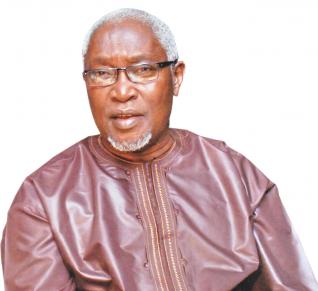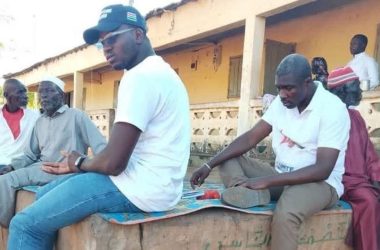 (JollofNews) — I am one Gambian who has lived my life in politics. I have been active in politics since I was given the mandate by the people of Serrekunda East to represent their affairs in Parliament in 1977.
(JollofNews) — I am one Gambian who has lived my life in politics. I have been active in politics since I was given the mandate by the people of Serrekunda East to represent their affairs in Parliament in 1977.
I started my political career as a parliamentary secretary from 1977 to 1981 when I was given the responsibility to establish the Ministry of Water Resources and the Environment, which I headed for eight years before being moved to the Ministry of Agriculture in 1989, where I was until the military coup in July 1994.
And I think it will be good for me to highlight the differences between former President Sir Dawda Jawara and his successor, President Yahya Jammeh. I have observed both leaders in their actions and deeds and the way they treat the Gambian people.
The People’s Progressive Party (PPP) was a mass party that belonged to the people. Sir Dawda was never part of the formation of the PPP. He was invited to lead the party, which was formed by the Gambian people, especially those who lived in the rural areas and wanted to establish a political organisation to address their grievances. These people went in search of a leader and the first man they contacted was Dr Marenah of the Agriculture Department, who directed them to Sir Dawda, who was then the head of the Veterinary Department. The two men had known each other while studying in the UK and Dr Marenah knew that Sir Dawda once served as president of the African Students’ Union in the UK and was interested in politics. Sir Dawda took up the responsibility of leading the PPP and has never lost sight of the people’s ownership of the party. All the organs of the party were functioning effectively and the decisions of these organs were respected by Sir Dawda.
During the PPP regime, everybody knows that all opposition leaders and opposition parties in the country were respected. The laws were respected, nobody was held in contempt by the authorities that be, the press was free and every Gambian was respected as a human being, his human rights were respected, the rule of law was prevalent and of course protected. Also, all institutions of laws like the police, the military, NSS which is now the NIA and the civil service were never politicised.
The civil service was apolitical and that was why during the PPP regime, all state institutions were never ever accepted to participate in party politics activities as they are institutions of the state that outlives governments. Sir Dawda has been the most open and tolerant leader Africa has ever had. The Gambia has been one of the countries that had multi-party democracy and held national elections every five years since independence while many African countries at the time were led by dictators and soldiers and held no regular elections. It was because of his beliefs in democracy, respect for the rule of law, respect for human rights and the sanctity of life, which made him to propose the establishment of the Human Rights Commission and the People and Human Rights Commission.
As a minister in his government, we enjoyed freedom under him in cabinet and all cabinet ministers went to cabinet meetings on Tuesdays with an open mind to say whatever we want to say about any issue that we were discussing. Sir Dawda has never ever agreed to concentrate power and resources on his hands alone. As a democrat, he knew that it would lead to the creation of a dictatorship, which would be detrimental to the progress of the country.
Sir Dawda was not only a leader who listens. He was a leader who believes in dialogue and consultations among his ministers and peers. He respects the opinions of other people and has never enforced his opinion on his cabinet and the Gambian people even though he was the president. 
During one cabinet meeting, Sir Dawda had a disagreement with Sheriff Sisay, who was the then minister for Finance. The debate was so tense that he requested for an independent opinion of someone, who was not in cabinet. The then cabinet secretary Abdoulie Sallah, was requested to invite Amie Bensouda from the Ministry of Justice to cabinet. When Amie Bensuouda arrived, Sir Dawda not wanting to be seen as being unfair gave Assan Jallow who was Minister of Justice the responsibility of explaining to her the different views of the two men. At the end Amie Bensouda gave her opinion on the matter, which Sir Dawda accepted there and then.
I once challenged him as Agriculture minister when it came to the attention of the cabinet that three plots of land on the Bosta extension in Fajara were given to the Gambia’s consult general in Switzerland, Mr Gould, Tariq Musa of TK Motors and Sara Janha. I told Sir Dawda that allocating the said plots of land for residential purposes on an area which was reserved for tourism developing was a violation of the laws that were passed by our government. I argued with him and the then minister for Local Government for over two hours before he accepted by position and rescinded the decision.
President Yahya Jammeh on the other hand, is leading an APRC party were all the powers and resources are totally concentrated in his hands. Since he came to power in 1994, the arrest and detention of people beyond the constitutional 72 hours has become the order of the day. I am one of those hundreds of Gambians who were arrested and detained well beyond the 72 hours without being told the reasons for my arrest or charge with any criminal offence and hundreds of Gambians have suffered just like me.
There is impunity and of course as you can see, many Gambians are now in detention for six, seven years without charge. This is highlighted every three or four months by Foroyaa newspaper. Many civil servants have been sacked to an extent that the country’s civil servants don’t even think of retirement now. You are either terminated or sacked. The civil service is so cannibalised that there is no system existing now. Virtually, the Public Service Commission (PSC) is not functional and is only there by name as there is no security of tenure. Important state institutions like the police, army and the NIA are very politicised, which undermines not only the dignity, respect and performances of civil servants, but erased the confidence that the public have in these institutions.
Today, the Gambia, which was shoulders high in Africa in terms of human rights and the rule of law, is not moving forward when it comes to enhancing the rule of law now. Everything is going backwards and this is reflected in the number of amendments of sections of the constitution in parliament, which empowers the rights and freedoms of the people.
For example, during the PPP era, the selection and election of village heads and district chiefs were left in the hands of the villagers and village heads of the district. They were traditionally and historically a local democratic function for people to elect their local leaders. Today, that has been taken away from the people and entrusted in the hands of the minister for Local Government and the President. 
The demarcation of parliamentary constituencies has been gerrymandered by APRC. For example the Fonis, which has less than 100,000 votes, has five MPs, while constituencies like Kombo North and Fulladu East with over 100, 000 votes have one member of parliament. In effect, the Independent Electoral Commission (IEC) has lost credibility and respect the moment it accepted constituencies with less than 30, 000 votes to have one MP while large constituencies with more than 60,000 votes to also have one MP. They are disenfranchising thousands of Gambians from their legitimate role to participate in political decision making process of the country. So these two systems are completely different.
In the PPP it was the organs that dictated the leader of the party. In the APRC, power and resources are totally concentrated in the hands of one man.
The PPP after 29 years had only six vehicles, but in the last election the APRC had over 30 vehicles. And after the elections, the president who is leader of the party was seen dishing out these vehicles of the APRC to the various state institutions like the police and armed forces as a gift. It’s beyond my imagination that a political party can be richer than the state in a short span of 18 years.
Yahya Jammeh came to power with promises of accountability, transparency and probity. We were accused of rampant corruption and nepotism and they established a lot commission of inquiries. All PPP ministers including Sir Dawda appeared before one of these commissions and Decree No. 11, which established that commission explicitly, said it would sit in public and the report would be made public.
Decree No. 25 said the draft report of the commission before it is published should be given to anyone who appeared before it to enable them to raise queries or objections to the recommendations. Not one of these requirements from Decree No. 11 and 25 were met and no Gambian apart from the four soldiers and the then Attorney General Fafa Mbai have seen the report. It has never been made public neither was I given a copy. It was all accusations and there was no truth in the accusations made against the PPP. I’m not saying that the PPP were angels. We were not perfect and have made mistakes, but it was not at the level we were accused of by Yahya Jammeh and his men when they took power. After 30-years of leadership, Sir Dawda at the time of being overthrown never had millions in any of his accounts. Today we have seen Yahya Jammeh, who after just being in power for 20 years giving out millions of Dalasis and vehicles to people. Where did he get all that money from? I want to know the source of that wealth because I have a legitimate right to know as a Gambian. Not only that, I was accused of being corrupt and went through a commission of inquiry that has never found me wanting despite heading two of the biggest ministries in the country with the biggest projects. That is why I think that Gambians should start questioning their own leaders.
Omar Amadou Jallow (OJ) was speaking to PK Jarju in Birmingham, UK





